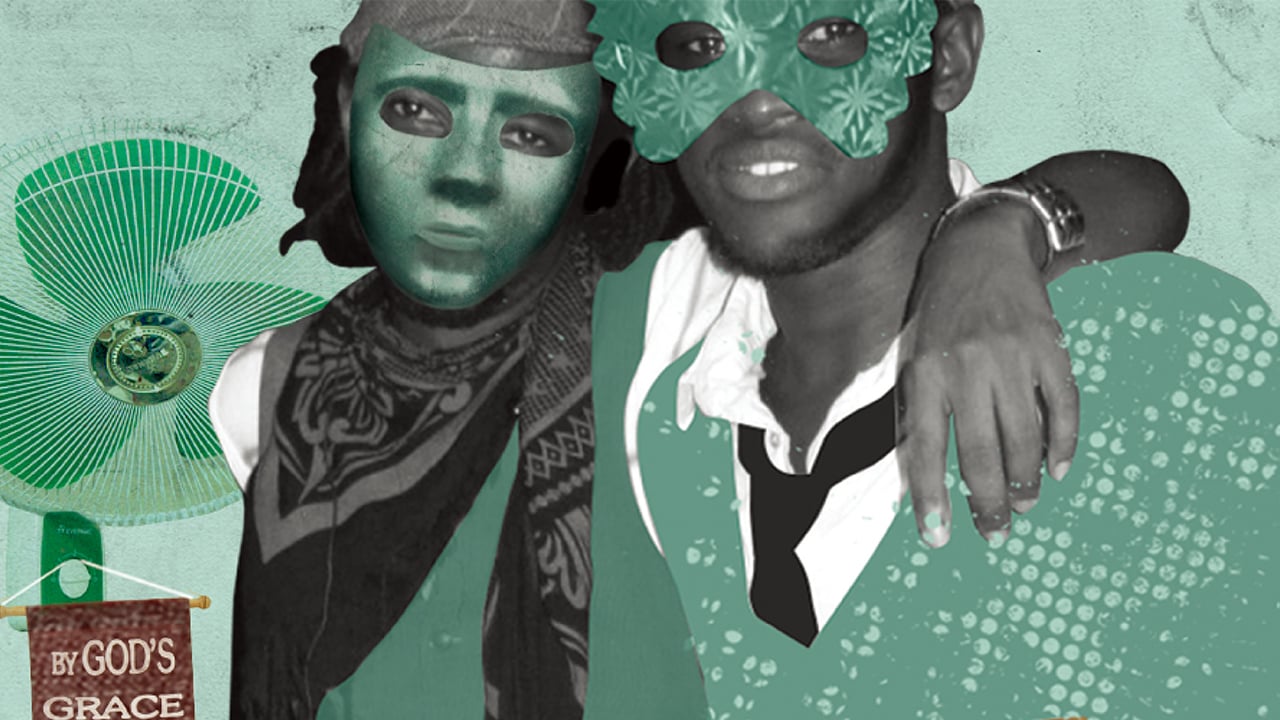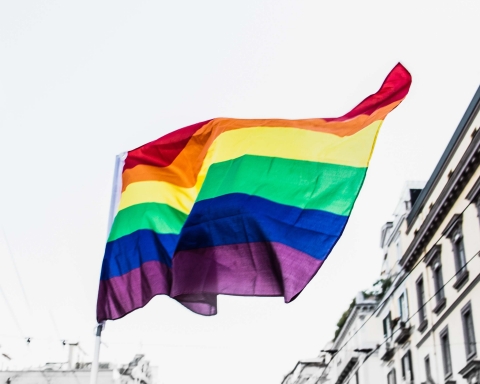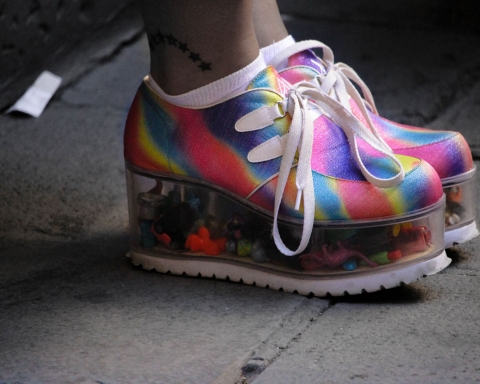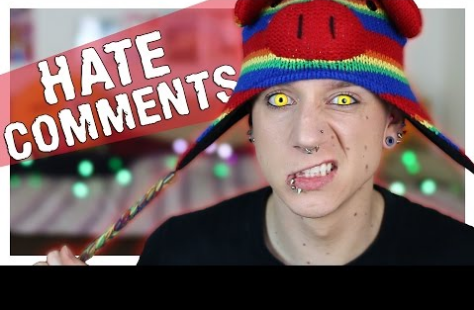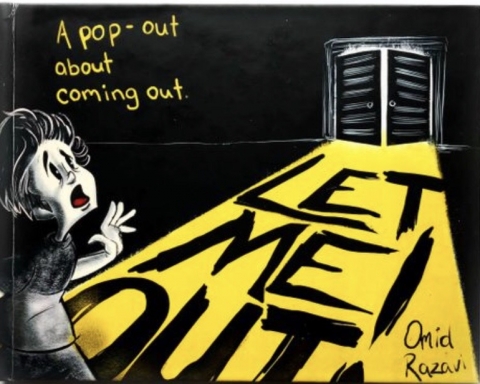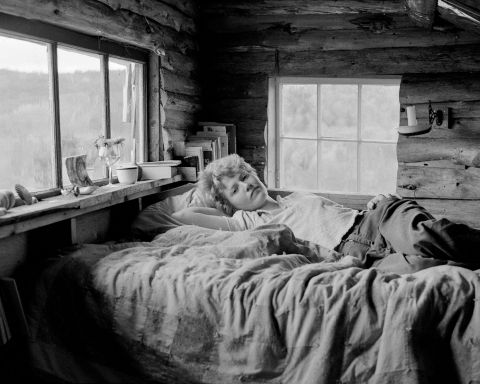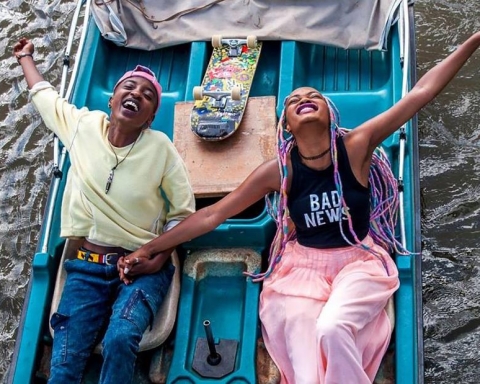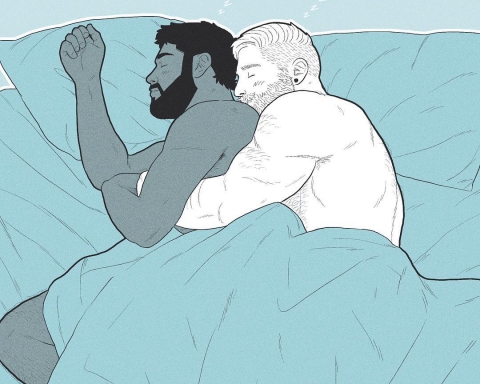We’re in the backyard of a house in Kampala, Uganda. There’s barbecue smoke, bottles of Coke and Fanta being passed around, music in the air and a spectacular cake sitting center stage on the garden table. This low-key gathering of smiling friends has come together to celebrate the 9th anniversary of their hosts: two Ugandan men. This is the opening scene of Call Me Kuchu, a documentary by Katherine Fairfax Wright and Malika Zouhali-Worral. Pastor Dennis Wamala leads the group of friends in a prayer of thanks and the cake is cut. The couple entwines arms, takes a sip from their respective glasses and the camera catches a lingering look of love shared between the two men.
The sound of their friends’ laughter melts into the cries of a frenzied crowd. We are pulled out of this domestic scene of quiet love and friendship to a religious rally where the crowd is being whipped up by the impassioned voices of Ugandan and American evangelical leaders.
“Uganda says no to homosexuality!”
The growling rhetoric of a preacher echoes eerily over the microphone as we see the couple eat a slice of their celebratory cake. A sense of terrible foreboding takes hold, for the stage of conflict is set.
It is 2010, shortly after the Anti-Homosexuality Bill, commonly known as the “Kill the Gays Bill”, was masterminded and submitted for voting by Member of Parliament David Bahati. The bill suggests life imprisonment for attempted gay activity and the death sentence for “aggravated homosexuality”, defined among other things by “serial” offenses. The bill also states that failure to report knowledge of a homosexual within 24 hours of discovery would result in 3 years imprisonment. Aiding and abetting the gay community (by providing HIV testing, for example) would be punishable by 7 years imprisonment.
It is in this political climate that we meet the protagonists of the documentary: David Kato, Uganda’s first openly gay man, LGBTQ activist and lesbian Naome Ruzindana and fellow activists Long Jones, Stosh and Kasha Jacqueline. The stakes are high and the faces of each of these characters show signs of the deep anxiety that lies beneath their easy smiles. They tell their stories to each other and to the camera, stories of corrective rape (an act intended to “cure” lesbians of homosexuality and “turn” them heterosexual), stories of unhappy heterosexual marriages, of the fear of coming out to their families, of the fear of being stoned to death. They also tell stories of the excitement and freedom of discovering themselves, stories of resilience and support and determination.
“People want to know our stories,” says Stosh, wiping away her tears, “That is one reason I decided to come out. No matter what.”
Call Me Kuchu (“kuchu” being a synonym for “queers”) presents a cast of profoundly moving, humane individuals, and yet the powers at be in Uganda don’t even see them as humans.
“The world needs to know that human rights do not mean gay rights,” says Giles Muhame, Managing Editor of Rolling Stone, one of Uganda’s weekly tabloid newspapers, and the man responsible for forcibly outing “100 (…) of Uganda’s Top Homos” and publishing headlines such as, “Homo Generals Plotted Kampala Terror Attacks” or “Hang Them! They Are After Our Kids!!”
When we meet Stosh for the first time, she is in hiding because Rolling Stone has published a photograph of her kissing her girlfriend. She ran away in the middle of the night as her friends tried to attack her with stones. The newspaper acquired the image the way it gets most of its defamatory material, by infiltrating the gay community; an investigative technique Muhame calls “Disguise”. He talks plainly about the newspaper’s plan to start “raiding” as soon as they have the right equipment.
“We shall ignore the right of privacy in the interest of the public.”
Back in the safe house, Stosh explains to Naome how she is so scared she no longer sleeps. The two women laugh out loud as if that were the only possible reaction in the face of how bad it’s gotten.
“I don’t sleep,” says Stosh again, “I’m tired…” The smile falls from her face and she plays anxiously with her hands.
Call Me Kuchu is the story of a 21st century witch-hunt. Muhame doesn’t consider sexual minorities to be a part of the “public” he claims to defend the interests of. The Ugandan media, government and evangelical church would have their people believe that sexual minorities are evil. The list of accusations against them is long. One striking claim is that homosexuality is a Western vice come to destroy African values such as family and community. This mindfully made documentary goes about deflating that long list of accusations, not by yelling louder than the frothing preachers, but by quietly showing who these activists really are. Is it a woman like Naome, who lends her ear to people in need, that will destroy family and community in Uganda? Or is it a man like Honourable Bahati, who wants mothers to denounce their sons and doctors to denounce their patients?
The terrible irony is that laws criminalizing homosexuality actually come from the West. The British imposed them on their colonies during the 19th century and more or less half of the 73 countries worldwide that still criminalize homosexuality are ex-British colonies.
“Britain (has) moved on (…) while here in the ex-colonies we’re holding on jealously to these draconian laws,” says Dr. Sylvia Tamale, Professor of Law.
There is an even more insidious connection between the West and the current anti-gay movement in Uganda. Honourable Bahati, Pastor Martin Ssempa and Bishop Julius Oyet have all received either mentoring or funding from U.S conservatives. It’s a connection that documentary-maker Roger Ross Williams explores in depth in God Loves Uganda. Feeling like they have lost the cultural war in the United States, Americans such as Lou Engle of the Evangelical Christian Right and Rev. Jo Anna Watson of the International House of Prayer have singled out Uganda as the new frontier. Their goal: to eradicate “sexual immorality” and “take over the world by the power of the Holy Spirit”. Williams’ documentary shows white missionaries whispering fervently into the ears of young Ugandans. The shot of a white hand clasped firmly over the head of a young boy is a searing image of the neo-colonial nature of this anti-gay crusade.
Call Me Kuchu takes us through highs and lows: A court victory lead by David Kato against Rolling Stone. A brief, magical instant of freedom when Long Jones and his friends hold an underground “Miss Kuchu 2010” competition. The chilling moment when one of David’s friends unknowingly recites a quote about how “the tree of freedom is watered by the blood of martyrs…”
However much you expect it, the murder of David Kato comes as a violent loss. When his funeral is sabotaged by a community pastor, the event nearly turns into a riot forcing David’s friends and family to flee with his casket. It is heartbreaking proof of how hatred strips people of their dignity and how hatred strips people of their humanity.
David’s extensive documentation of LGBTQ rights violations in Uganda and the international reaction provoked by his death have delayed the voting of the Anti-Homosexuality Bill. It has yet to come before parliament.
While the Bible might have arrived in Africa with the first European missionaries, it is now hard to imagine an Africa without it. If religion is at the heart of this conflict, what possible resolution can there be? What peaceful outcome is possible when Biblical law is placed above any other law? In the words of Roger Ross Williams, religion has the power to “destroy” lives, but is also has the power to “transform” them. Religion is the problem and perhaps religion can be the answer.
In July 2013, South Africa’s retired archbishop Desmond Tutu expressed his passion for the LGBTQ cause: “I would not worship a God who is homophobic and that is how deeply I feel about this.” He went on to say, “I would refuse to go to a homophobic heaven. No, I would say sorry, I mean, I would much rather go to the other place.”
Luckily Desmond Tutu is not the only religious figure standing up for the rights of sexual minorities in Africa. Call Me Kuchu introduces us to ex-Bishop Christopher Senyonjo. He is a man who has understood that being gay is not something you can talk people into or out of. His level-headedness and kind words are a balm on the sores of those he councils. Siding with LGBTQ activists cost him his position in his church, but it hasn’t stopped him from creating safe spaces for people in need, spaces in which to mourn the dead and spaces in which to listen to the living.
“There is neither Jew nor Greek, there is neither slave nor free, there is neither male nor female (…) I think if Paul was living at this time, he would even put: there is neither LGBT nor straight. We are all one.” – Christopher Senyonjo
By Jo Jackson

